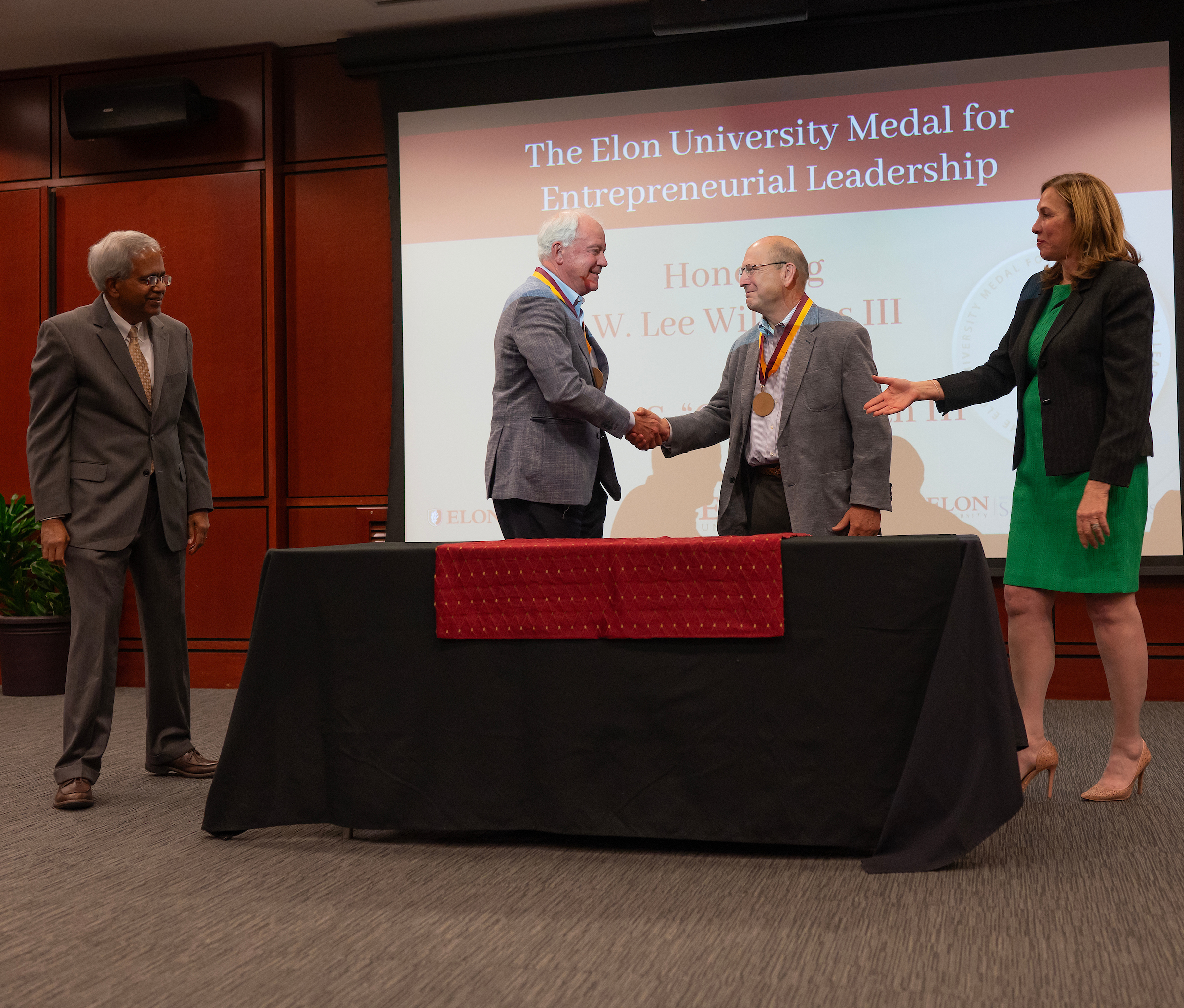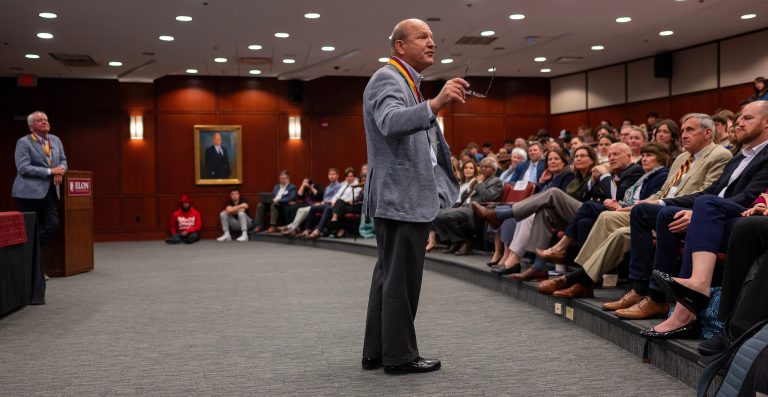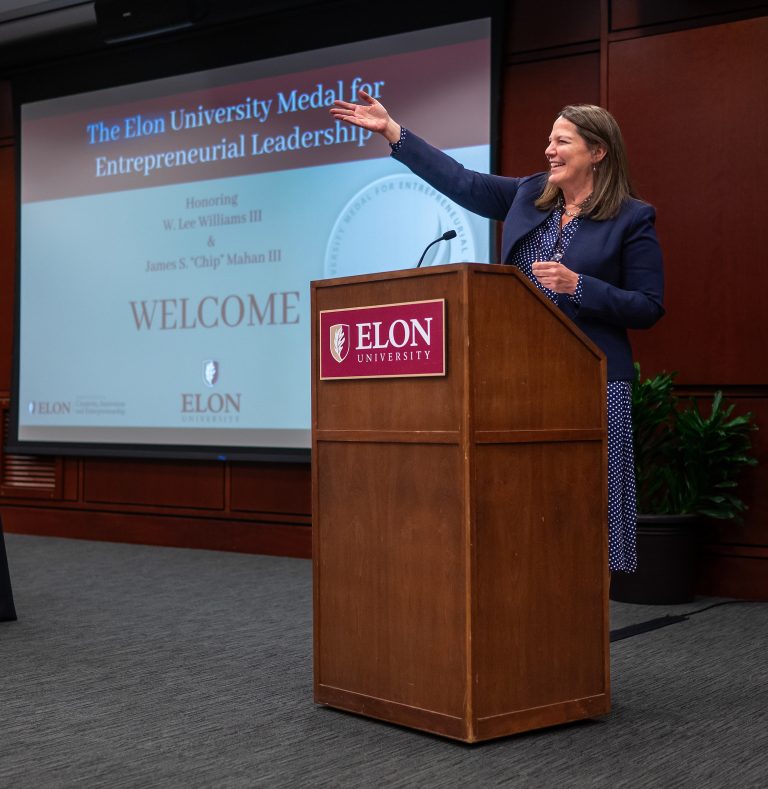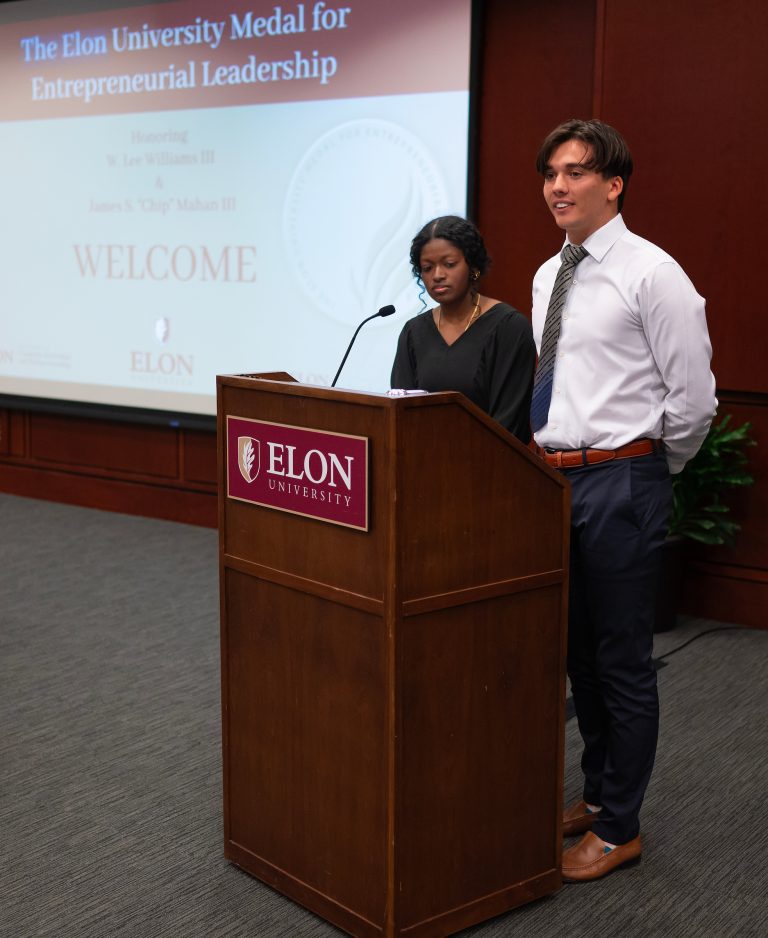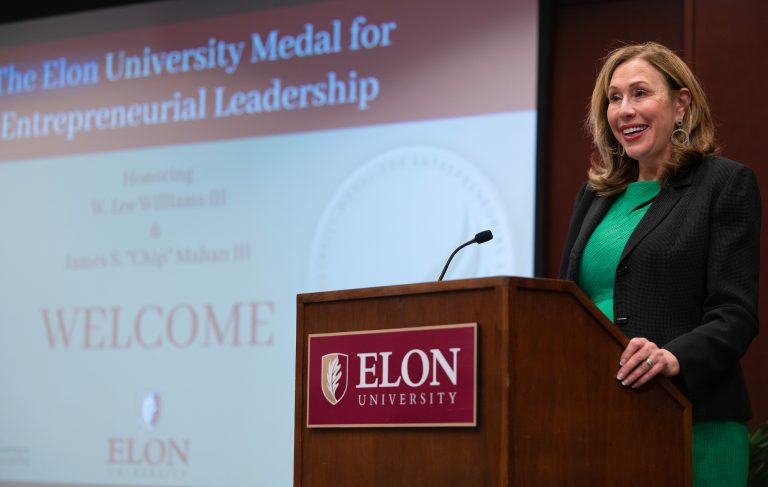W. Lee Williams III and James S. "Chip" Mahan III were recognized for their vision and accomplishments during a ceremony at the Koury Business Center on Thursday, March 21.
Through their sincere commitment to comprehensive customer service and a vision for how to leverage technology to make banking more personalized, accessible and responsive, the founders of Wilmington, N.C.-based Live Oak Bancshares have built one of the country’s most active small business lenders and bankers, with plans for continued growth in the decades to come.
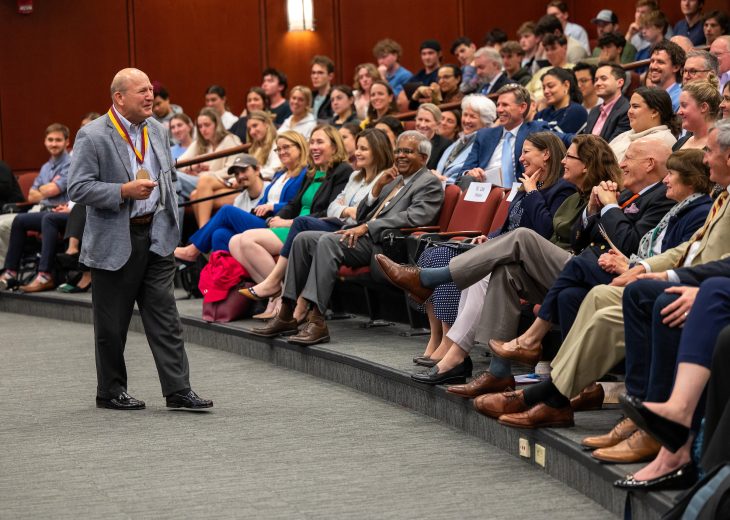
In recognition of all the pair has achieved, W. Lee Williams III and James S. “Chip” Mahan III were awarded the Elon University Medal for Entrepreneurial Leadership on Thursday during a ceremony that provided an opportunity for students to engage with these banking leaders and feed off of their enthusiasm for innovation and service. The Doherty Center for Creativity, Innovation and Entrepreneurship awards the medal to entrepreneurs who are leaders in their industry and exemplifies the university’s values — integrity, innovation, creativity, lifelong learning and building dynamic communities.
In presenting Williams, an Elon University trustee, and Mahan with the medal, President Connie Ledoux Book noted that the honor is designed to celebrate those who have forged new paths through innovation and dedication. Citations for the honor noted how Williams and Mahan exemplify the entrepreneurial spirit and values that Elon holds dear.
“They are visionaries, they are reformers, and they bring their integrity and their values into their work,” Book said before Williams and Mahan were presented with their medals. “The awarding of the Elon University Medal for Entrepreneurial Leadership serves as an inspiration to all of us here at Elon, to the community and beyond.”
In her introduction of Williams and Mahan, Doherty Center Executive Director Alyssa Martina shared an overview of how the two business leaders came to know each other and how they have worked together to achieve success during the past five decades. The two met in 1973 as young members of the team at Winston-Salem-based Wachovia, which would grow into a national financial services provider before being purchased by Wells Fargo. During their time at Wachovia, the two grew together, both professionally and personally, and in 2008, they decided to launch Live Oak Bancshares with a new vision for how a bank could serve small businesses.
Williams and Mahan both turn 73 this year, and Williams noted that they were maybe “the world’s oldest entrepreneurs” when they founded Live Oak 16 years ago. Williams now serves vice chairman while Mahan is chairman and CEO of Live Oak Bancshares, the parent of Live Oak Bank.
“The past 15 years have been the most exciting time I have had. And the thing is, if you talk to this guy right here,” Williams said, motioning to Mahan, “he’ll tell you we are in the second batter of the first inning with no outs. … But it’s been a privilege for me to go to work every day and I am certainly looking forward to innings two, three, four, five, six, seven, eight and nine.”
Williams and Mahan pursued a model that would allow them to build their bank by serving small businesses that were underserved by larger institutions. That was achieved through better understanding of businesses within certain sectors, such as veterinarian offices, and leveraging digital banking tools that allowed them to be even more responsive without the overheard that comes with running bricks-and-mortar bank branches across a large footprint. Live Oak was able to provide small business owners with an answer to their loan applications within three days rather than three weeks to a month, as was standard for larger lenders, and provide them with an online banking experience that makes funding available quickly and integrates into their business practices.
“It is amazing what good service will get you,” Williams said. “To speedily get an answer to a borrower and to provide them with the technology to make it easy to do business goes miles and miles and miles. … Speed is our weapon.”
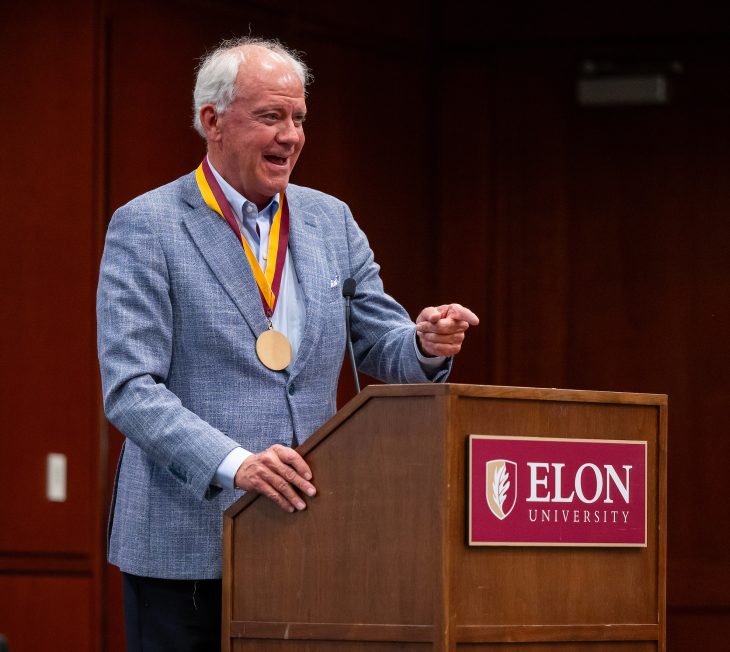
Mahan explained that they took the view that “small business America had been orphaned,” and so Live Oak sought out relationships with small business owners who were unable to find financial options. Live Oak immersed itself in the Small Business Administration’s lending products and became a national leader in SBA lending.
Live Oak received its charter in May 2008, just as a global financial crisis was beginning to take hold. Its first year saw growth, but there were questions about whether their model and vision would be successful. Among those questioning Live Oak was the FDIC, with Live Oak’s leaders traveling to Atlanta in March 2009 to meet with regulators during a period when the solvency of many financial institutions was in question. Mahan recounts being told by the head of the FDIC that Live Oak should sell or liquidate the bank. At the time, the bank had $140 million in loans to veterinary offices, and Mahan said he responded by saying that they were committed to their customers.
Williams said it was important during that stretch to feel good about and have confidence in their business plan. “That’s what we fell back on at that point in time,” Williams said. “We knew we had a good business plan where the revenues that we would generate would be greater than the expenses it would take to generate them. You just have to rely on what you know is right.”
Mahan shared that 10 years ago Live Oak was a $400 million bank, and today has $11.2 billion in assets. A decade ago it had $48 million in capital and today has $902 million in capital.
The traditional model for growth within the banking sector has been to acquire other banks to expand market share and enter new geographies, but Live Oak dismissed that approach. Instead, Live Oak focused on serving a nationwide base of customers by leveraging growth within banking technology and growing its lending portfolio while expanding into deposits and other financial products that can be delivered online. Mahan said growth of its business rather than a focus on acquisition has allowed Live Oak the ability to avoid the challenges that come from absorbing other business entities, such as conflicting business cultures or layoffs that can come from redundancy through acquisitions.
“We don’t want to fire people — we want to hire people,” Mahan said.
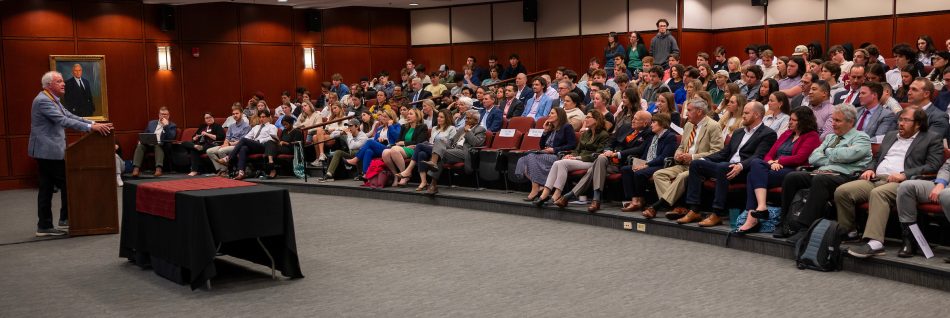
At the same time, Live Oak’s investment in technology and decision to leverage the power of other cloud-first providers such as Amazon Web Services has provided the opportunity to develop digital banking products that could be spun off themselves and marketed to other banking institutions. Live Oak has been able to use technology to better integrate its services into the business practices of its customers to provide more seamless financial support.
“We can embed our bank inside a veterinary practice management software, inside a funeral home management software, and become part of who they are, a part of everything they do,” Mahan said.
Ensuring that Live Oak can deliver the robust customer service support that is a core tenet of its business depends upon robust support of its own employees, Mahan and Williams said. The bank covers 100 percent of the cost of health insurance for bank employees and their families, offers a generous retirement plan match, maintains two planes that support business travel for employees serving customers nationwide and shares financial successes with employees. Among those in the crowd for Thursday’s event were 10 Elon alumni who are now with Live Oak Bank.
“You have to think about that every day,” Mahan said. “How am I going to put another log on the fire for 100 percent of the people in this bank, not just the best operator. … You say this is what we’re going to do. Now what are you going to do? You’re going to treat every customer like the only customer.”
During the event, Doherty Center scholars Lars Heidenrich ’24 and Trinity Swepson ’24 offered a welcome as well as their own perspectives on entrepreneurship at Elon. “The spirit of entrepreneurship and innovation thrives here at Elon,” Heidenreich said. “My experiences have offered me a first-hand look at the many ways through which Elon excels in fostering innovation and entrepreneurial thinking.”
Swepson shared that her work with the Oak Originals initiative, which helps provide student entrepreneurs with opportunities to connect with potential customers, is among the experiences that have fostered her growth. “In my time here, I have truly experienced the Doherty Center as a space to collaborate, lead and create, whether it be communicating and coordinating with student vendors, working with various teams at the Doherty Center or networking,” she said. “My experience at the center has been an incredible learning opportunity.”



